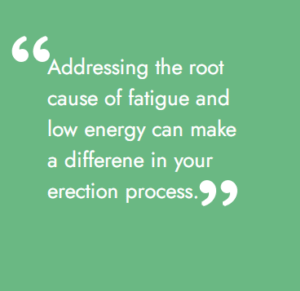
Men of all ages can experience erectile dysfunction.
Impotence comes with shame, embarrassment, and feelings of isolation. Men might see this as a weakness and a failure, but nothing could be further from the truth.
These men are not alone.
For men facing sexual dysfunction, access to treatment is easier and more affordable than ever. The growing awareness and acceptance of erectile dysfunction in our culture, coupled with the technology advances, makes the topic of erection difficulties unavoidable.
Men who are not (yet) experiencing ED are constantly bombarded with TV, radio, and internet ads about treatment options. All this exposure opens the door to the questions:
- “Is this normal for my age?
- “What is the average age a man experiences ED?”
- “When could this happen to me?”
The answer to these questions is more complex than a simple number or average.
Defining Erectile Dysfunction
There are various definitions for erectile dysfunction. Erection problems can happen during the following scenarios:
- Trouble gaining erections.
- Trouble maintaining erections.
- Decreases in rigidity.
There are many additional variables within each of these categories and these variations can lead to confusion.
How often erectile dysfunction occurs is also an important factor in defining ED.

If a 47-year-old man believes he only had ED when he could no longer gain an erection during masturbation, he will only report ED starting at age 47. He may have struggled with other aspects of ED earlier in his life, but was not bothered by them.
Even when questioned, he may have very inaccurate memories as to when – or if -there were other occurrences of ED.
At the same time, a 22-year-old man who struggles on occasion to maintain an erection during penetrative sex can seek help for ED. Both men have aspects of ED but are in very different situations. Does the 22-year-old have ED? Did the 47-year-old first experience ED now?
As you can see, these men utilize different definitions of ED leading to diagnosis at very different ages. These two men may have very similar ED profiles over their lifespan, but their circumstances led them in very different directions.
Both experiences may be normal and age appropriate.
When reviewing studies on the average age of erectile dysfunction, it is important to closely examine what definitions of ED are being used and whether the men involved are self-reporting or are being interviewed.
This can meaningfully impact the outcome of each study and can lead to distinct differences in what the reported prevalence of ED is at each age category.
For our perspective, the averages are less dependent on specific or exact definitions of ED and would be more focused on men’s experience of distress stemming from erection challenges. This is likely to yield a higher prevalence in each age category. And we don’t think that is a problem.
Distress About Erections

The experience of erectile dysfunction in any of its manifestations can cause distress.
This can quickly erode sexual pleasure and satisfaction and lead to anxiety, depression, and relationship challenges.
All of these can negatively impact future erections and lead men to seek help.
On the other hand, when men are not distressed by some manifestations of ED it is unlikely to be identified, and they will not seek help.
Most men will be distressed at the onset of erection challenges. Young men experience robust erections through their adolescence and into their early adult years.
Getting an erection is all but automatic. Young men don’t think twice about erections or the process that enables them. That is until something changes, and the erection process becomes less reliable.
Many men will be concerned by their erection challenges at any age and this is far more common than is reported. We want men to know this and understand that it is normal. This distress can often times be addressed and improved.
Why Average Age Matters
Erectile dysfunction is far more common than people think. At any age, a man should not feel alone with this challenge. Even younger men are facing ED at higher rates than we earlier thought. Seeing the averages can help to normalize just how common this condition is.
Average doesn’t mean normal. Men need to remember that if 10 or 20 percent of men their age are experiencing ED that is a significant number of people. Many conditions and other life situations do not have nearly as high a prevalence.
Why It Does Not Matter

By definition about half of men will experience ED earlier than the average. If men choose to focus on this statistic, they can feel dejected, frustrated, and worried. While many men think their situation is uniquely different and special, this is rarely the case.
In short, averages should be used to help men understand that they are not alone and are normal. If a man uses these numbers to prove to himself that there is something defective or fundamentally wrong with him, then he risks further deepening his challenges.
By the Numbers
Based on some of the larger studies that have been conducted, the general rule seems to be: starting in your 30’s, your age correlates to the percentage of men who are experiencing erection challenges.
In other words, 30 percent of men in their 30’s, 40 percent of men in their 40’s, and 50 percent of men in their 50’s will experience ED.
It is estimated that at least half of all men have or are experiencing some form of erection challenges by age 50. It is well established that as men age, the likelihood of experiencing erectile dysfunction increases.
Erectile dysfunction is both a medical and psychological condition. As people age, they face more medical challenges. This includes conditions that impact blood flow. Lower libido is also common as men age; this leads to less sexual motivation and activity.
Just because erectile dysfunction is common does not mean that it cannot be addressed. The causes of ED at any age are caused by many factors. Working with the right combination of professionals can lead to much better outcomes.
— Article Updated January 2022 —
Ready to Learn More?
Erection IQ founder Mark Goldberg helps men resolve erectile dysfunction. He offers individual, one-on-one services to men throughout the world through a secure, telehealth platform. It’s 100% confidential. You can visit the Center for Intimacy, Connection and Change website toSchedule A Consultationwith Mark.


